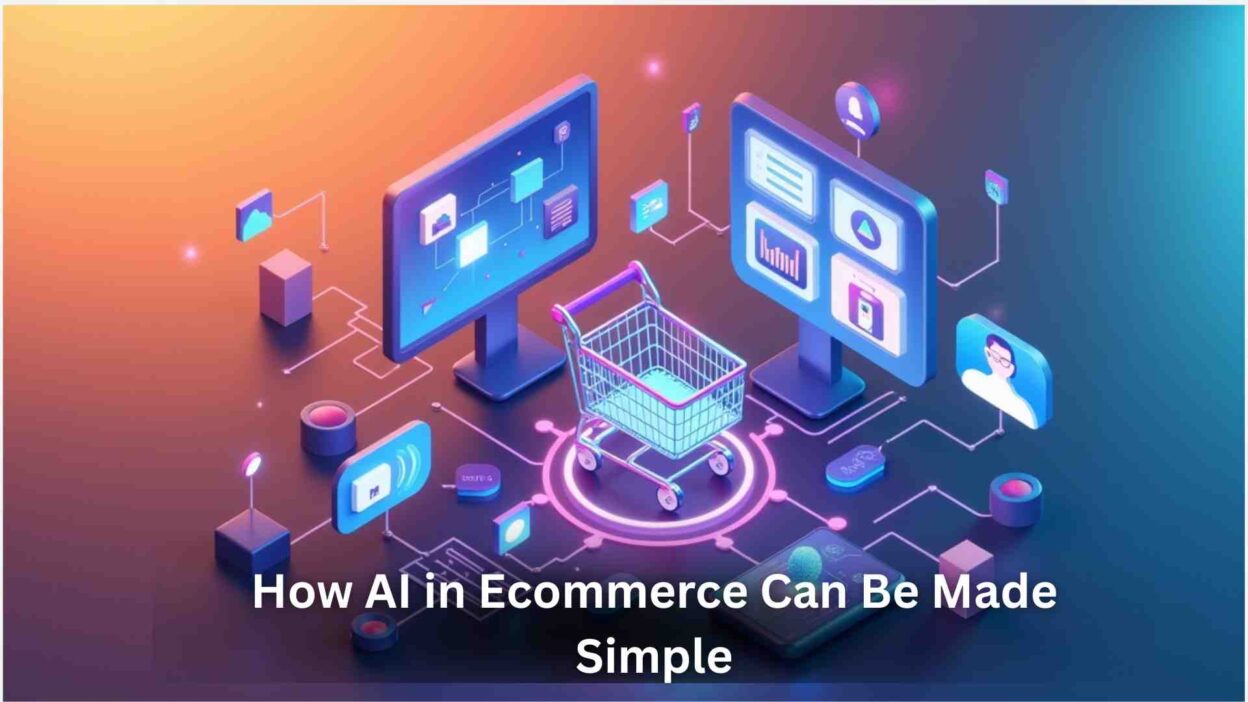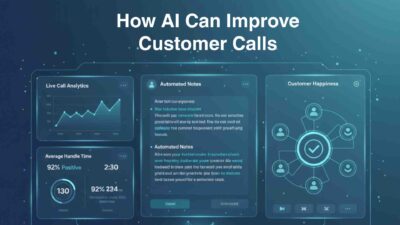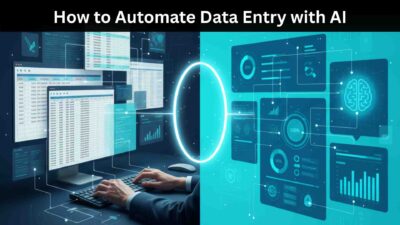Introduction
TL;DR AI for e-commerce changes how online businesses operate today. Modern retailers implement artificial intelligence to streamline operations, boost sales, and enhance customer experiences. Small businesses worry about complexity, but AI in ecommerce becomes simple with the right approach.
Table of Contents
Online stores generate massive amounts of data daily. Customer behavior, purchase patterns, inventory levels, and market trends create valuable insights. AI systems process this information instantly. They provide actionable recommendations that drive business growth.
What Makes AI Essential for Modern Ecommerce
The Current Ecommerce Landscape
Global ecommerce sales reached $5.7 trillion in 2023. Competition increases daily as new online stores launch every minute. Customers expect personalized experiences, instant responses, and seamless shopping journeys. Manual processes cannot meet these demands effectively.
Why Traditional Methods Fall Short
Manual inventory management costs retailers $1.1 trillion annually in lost revenue. Human customer service agents handle only 50-60 calls per day. Email marketing campaigns without personalization achieve 2.1% open rates on average. These statistics highlight the need for intelligent automation.
The AI Advantage
AI-powered ecommerce platforms increase conversion rates by 30% on average. Automated customer service reduces response times from hours to seconds. Predictive analytics prevent stockouts 85% of the time. Smart recommendation engines drive 35% of Amazon’s revenue.
Core AI Applications That Transform Ecommerce Operations
Intelligent Product Recommendations
AI recommendation systems analyze customer behavior patterns. They identify products that specific customers will likely purchase. Netflix-style algorithms work perfectly for ecommerce platforms.
Machine learning models process browsing history, purchase data, and demographic information. They create personalized product suggestions in real-time. Recommendation accuracy improves with every customer interaction.
Implementation Benefits
- Increase average order value by 25-40%
- Boost customer retention rates by 45%
- Reduce cart abandonment by 15%
- Generate 20-35% of total revenue
Automated Customer Service Solutions
AI chatbots handle 80% of routine customer inquiries instantly. Natural language processing understands customer questions accurately. Automated responses resolve common issues without human intervention.
Modern chatbots integrate with inventory systems, order tracking, and payment processors. They provide real-time updates on order status, shipping information, and product availability. Complex issues escalate to human agents automatically.
Key Capabilities
- 24/7 customer support availability
- Multi-language communication support
- Order processing and tracking updates
- Product information and recommendations
- Return and refund processing
Dynamic Pricing Optimization
AI algorithms analyze competitor prices, demand patterns, and market conditions. They adjust product prices automatically for maximum profitability. Dynamic pricing increases revenue by 10-25% for most retailers.
Price optimization considers inventory levels, seasonal trends, and customer segments. Premium customers might see different prices than price-sensitive shoppers. AI ensures optimal pricing strategies for every situation.
Pricing Strategy Benefits
- Real-time competitor price matching
- Demand-based pricing adjustments
- Inventory clearance optimization
- Profit margin protection
- Customer segment targeting
Inventory Management Revolution Through AI
Predictive Analytics for Stock Management
AI systems predict future demand with 95% accuracy. They analyze historical sales data, seasonal patterns, and market trends. Inventory optimization prevents both stockouts and overstock situations.
Machine learning algorithms consider external factors like weather, holidays, and economic conditions. They adjust inventory recommendations accordingly. Smart systems reduce carrying costs by 30% while maintaining service levels.
Automated Reordering Systems
AI-powered inventory management triggers automatic purchase orders. Systems monitor stock levels continuously. They place orders with suppliers when inventory reaches predetermined thresholds.
Automated reordering considers lead times, supplier reliability, and demand fluctuations. It ensures optimal stock levels without manual intervention. Businesses reduce inventory costs while improving customer satisfaction.
Inventory Management Features
- Real-time stock level monitoring
- Automated supplier communications
- Demand forecasting accuracy
- Seasonal adjustment capabilities
- Multi-location inventory synchronization
Supply Chain Optimization
AI optimizes entire supply chain operations. Systems analyze supplier performance, shipping routes, and delivery times. They identify bottlenecks and suggest improvements automatically.
Predictive analytics help businesses choose the best suppliers for specific products. AI considers cost, quality, delivery speed, and reliability factors. Supply chain efficiency improves by 40% with AI implementation.
Personalization Strategies That Drive Customer Engagement
Behavioral Analysis and Segmentation
AI systems track customer behavior across all touchpoints. They identify browsing patterns, purchase preferences, and engagement levels. Advanced segmentation creates micro-audiences for targeted marketing.
Customer segments receive personalized content, product recommendations, and promotional offers. Behavioral triggers activate automated email sequences. Personalization increases click-through rates by 300%.
Content Personalization Techniques
AI customizes website content for individual visitors. Homepage layouts change based on customer preferences. Product categories reorganize according to browsing history. Personalized content increases time on site by 65%.
Dynamic content systems test different layouts automatically. They optimize for conversion rates in real-time. A/B testing happens continuously without manual setup. Best-performing content variations scale across the platform.
Personalization Implementation
- Individual homepage customization
- Product category prioritization
- Personalized search results
- Targeted promotional banners
- Custom email content creation
Email Marketing Automation
AI-powered email systems send perfectly timed messages. They analyze customer behavior to determine optimal send times. Open rates increase by 50% with intelligent timing algorithms.
Automated email sequences nurture leads through the sales funnel. Cart abandonment emails recover 25% of lost sales. Product recommendation emails generate 40% higher revenue than generic newsletters.
Conversion Optimization Through AI Technology
Smart Search Functionality
AI-powered search understands customer intent better than keyword matching. Natural language processing interprets complex queries accurately. Visual search allows customers to find products using images.
Search algorithms learn from customer behavior patterns. They improve results continuously based on click-through data. Intelligent search increases conversion rates by 45%.
Advanced Search Features
- Voice search compatibility
- Image-based product discovery
- Autocomplete suggestions
- Spell correction capabilities
- Synonym recognition technology
Checkout Process Optimization
AI analyzes checkout abandonment patterns. It identifies friction points in the purchase process. Automated optimization removes barriers to conversion.
Smart systems suggest payment methods based on customer preferences. They pre-fill forms using saved information. One-click checkout options reduce abandonment by 35%.
Fraud Detection and Prevention
AI fraud detection systems analyze transaction patterns in real-time. They identify suspicious activities before payments process. Machine learning models adapt to new fraud techniques automatically.
Legitimate transactions proceed smoothly while suspicious ones require additional verification. False positive rates decrease by 70% with AI implementation. Customer experience improves while security increases.
Marketing Automation and Customer Acquisition
Social Media Intelligence
AI tools monitor social media conversations about brands and products. They identify trending topics and customer sentiment. Social listening informs marketing strategies and product development.
Automated social media management posts content at optimal times. AI systems engage with customers through comments and direct messages. Social media ROI increases by 60% with intelligent automation.
Advertising Campaign Optimization
AI advertising platforms optimize campaigns continuously. They adjust bids, targeting, and creative elements automatically. Machine learning algorithms improve performance over time.
Automated campaigns test multiple ad variations simultaneously. They allocate budget to the best-performing advertisements. Cost per acquisition decreases by 40% with AI optimization.
Campaign Optimization Benefits
- Real-time bid adjustments
- Audience targeting refinement
- Creative performance analysis
- Budget allocation optimization
- Cross-platform campaign management
Customer Lifetime Value Prediction
AI models predict customer lifetime value accurately. They identify high-value customers early in the relationship. Marketing efforts focus on customers with highest potential value.
Retention strategies target customers at risk of churning. Predictive models identify warning signs before customers leave. Proactive retention efforts increase customer lifetime value by 25%.
Implementation Strategies for Different Business Sizes
Small Business AI Solutions
Small ecommerce businesses start with basic AI tools. Chatbot platforms like Intercom or Zendesk Chat provide instant customer service. Email automation tools like Mailchimp offer AI-powered send time optimization.
Simple recommendation widgets integrate easily with existing websites. Google Analytics Intelligence provides automated insights about customer behavior. These tools require minimal technical expertise.
Budget-Friendly AI Tools
- Chatbot platforms ($50-200/month)
- Email automation systems ($20-100/month)
- Basic recommendation engines ($100-300/month)
- Social media automation ($30-150/month)
- Analytics intelligence (free-$50/month)
Mid-Sized Business Integration
Medium-sized businesses implement comprehensive AI platforms. Shopify Plus, BigCommerce Enterprise, and WooCommerce offer built-in AI features. These platforms integrate multiple AI capabilities seamlessly.
Customer data platforms unify information from all touchpoints. Advanced analytics provide deeper insights into customer behavior. Marketing automation becomes more sophisticated with larger datasets.
Enterprise-Level AI Implementation
Large enterprises develop custom AI solutions. They integrate multiple specialized systems for different functions. Enterprise implementations require dedicated technical teams.
Advanced machine learning models process massive datasets. Real-time decision engines optimize thousands of variables simultaneously. Custom AI solutions provide competitive advantages.
Data Management and Privacy Considerations
Customer Data Collection Strategies
AI systems require quality data for optimal performance. Customer consent becomes crucial for data collection. Transparent privacy policies build trust with customers.
First-party data provides the best insights for AI algorithms. Email subscriptions, account registrations, and purchase history create valuable datasets. Quality matters more than quantity for AI training.
GDPR and Privacy Compliance
AI implementations must comply with privacy regulations. GDPR requires explicit consent for data processing. Customers retain right to access and delete personal information.
Privacy-by-design principles guide AI system development. Data minimization reduces privacy risks. Anonymization techniques protect customer identities while preserving insights.
Privacy Best Practices
- Transparent data collection policies
- Secure data storage systems
- Regular privacy audits
- Customer consent management
- Data retention policy enforcement
Data Security Measures
AI systems handle sensitive customer information. Encryption protects data during transmission and storage. Access controls limit who can view customer data.
Regular security audits identify potential vulnerabilities. Automated monitoring detects suspicious access patterns. Data backup systems ensure business continuity.
Measuring AI Success and ROI
Key Performance Indicators
AI success requires measurable metrics. Conversion rate improvements indicate effective personalization. Customer service metrics show automation benefits.
Revenue per visitor measures overall AI impact. Cart abandonment rates reflect checkout optimization success. Customer satisfaction scores indicate service quality improvements.
Essential AI Metrics
- Conversion rate increases
- Average order value growth
- Customer acquisition cost reduction
- Customer lifetime value improvement
- Support ticket resolution time
ROI Calculation Methods
AI ROI calculations include direct revenue increases and cost savings. Automation reduces labor costs significantly. Improved efficiency generates additional capacity.
Customer retention improvements provide long-term value. Reduced cart abandonment translates to immediate revenue gains. Inventory optimization saves carrying costs.
Continuous Improvement Strategies
AI systems improve through continuous learning. Regular performance reviews identify optimization opportunities. A/B testing validates algorithm improvements.
Customer feedback guides AI development priorities. New features roll out gradually to test effectiveness. Successful implementations scale across the platform.
Future Trends in Ecommerce AI
Emerging Technologies
Voice commerce integration transforms shopping experiences. Augmented reality helps customers visualize products. Predictive shipping anticipates customer orders.
Blockchain technology enhances supply chain transparency. Internet of Things devices provide real-time inventory updates. 5G connectivity enables more sophisticated AI applications.
Market Evolution Predictions
AI adoption accelerates across all business sizes. Small businesses access enterprise-level AI capabilities through cloud platforms. Competitive pressure drives rapid AI implementation.
Customer expectations continue to rise for personalized experiences. Businesses without AI fall behind competitors quickly. AI becomes essential for ecommerce survival.
Technology Advancement Areas
- Natural language processing improvements
- Computer vision enhancements
- Predictive analytics accuracy
- Real-time decision making
- Cross-platform integration
Preparing for an AI-Driven Future
Businesses invest in AI-ready infrastructure today. Cloud-native platforms support rapid scaling. Data quality improvements enable better AI performance.
Team training ensures successful AI adoption. Change management processes guide implementation. Continuous learning cultures embrace AI innovations.
Common Implementation Challenges and Solutions
Technical Integration Issues
Legacy systems create integration challenges. API limitations restrict AI functionality. Data silos prevent unified customer views.
Modern integration platforms solve connectivity problems. Cloud-based solutions offer better flexibility. Gradual migration strategies reduce implementation risks.
Budget and Resource Constraints
AI implementation requires significant investment. Technical expertise costs create barriers. Training expenses add to overall costs.
Phased rollout approaches spread costs over time. SaaS solutions reduce upfront investments. Training programs develop internal capabilities gradually.
Cost Management Strategies
- Start with high-impact, low-cost solutions
- Use pilot projects to prove ROI
- Leverage vendor training programs
- Consider managed service providers
- Plan for gradual feature expansion
Change Management Resistance
Employees fear job displacement from AI automation. Customers worry about privacy implications. Stakeholders question AI investment returns.
Communication strategies address concerns proactively. Training programs show AI enhances human capabilities. Success stories build confidence in AI benefits.
Read More: How Construction Companies Automate Project Update Calls
Conclusion

AI for e-commerce fundamentally transforms online businesses. Simple implementation strategies make advanced technology accessible to all business sizes. Success requires careful planning, quality data, and continuous optimization.
Modern customers expect AI-powered experiences. Businesses implementing AI gain significant competitive advantages. Revenue growth, cost savings, and customer satisfaction improvements justify AI investments.
The future belongs to AI-enabled ecommerce platforms. Early adopters capture market share advantages. Delayed implementation becomes increasingly costly over time.
Start your AI for e-commerce journey today with simple automation tools. Expand capabilities gradually as experience grows. Transform your ecommerce business with intelligent technology solutions.






[…] Read More: How AI in E-commerce Can Be Made Simple […]